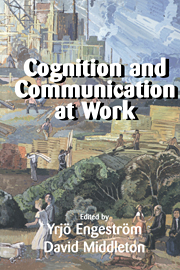Book contents
- Frontmatter
- Contents
- Contributors
- Acknowledgments
- 1 Introduction: Studying work as mindful practice
- 2 Distributed cognition in an airline cockpit
- 3 Constituting shared workspaces
- 4 Seeing as situated activity: Formulating planes
- 5 Convergent activities: Line control and passenger information on the London Underground
- 6 Users and designers in mutual activity: An analysis of cooperative activities in systems design
- 7 System disturbances as springboard for development of operators' expertise
- 8 Expert and novice differences in cognition and activity: A practical work activity
- 9 The tensions of judging: Handling cases of driving under the influence of alcohol in Finland and California
- 10 Talking work: Argument, common knowledge, and improvisation in teamwork
- 11 The collective construction of scientific genius
- 12 Experience and the collective nature of skill
- 13 Working together: Symbolic interactionism, activity theory, and information systems
- 14 On the ethnography of cooperative work
- Index
1 - Introduction: Studying work as mindful practice
Published online by Cambridge University Press: 05 June 2012
- Frontmatter
- Contents
- Contributors
- Acknowledgments
- 1 Introduction: Studying work as mindful practice
- 2 Distributed cognition in an airline cockpit
- 3 Constituting shared workspaces
- 4 Seeing as situated activity: Formulating planes
- 5 Convergent activities: Line control and passenger information on the London Underground
- 6 Users and designers in mutual activity: An analysis of cooperative activities in systems design
- 7 System disturbances as springboard for development of operators' expertise
- 8 Expert and novice differences in cognition and activity: A practical work activity
- 9 The tensions of judging: Handling cases of driving under the influence of alcohol in Finland and California
- 10 Talking work: Argument, common knowledge, and improvisation in teamwork
- 11 The collective construction of scientific genius
- 12 Experience and the collective nature of skill
- 13 Working together: Symbolic interactionism, activity theory, and information systems
- 14 On the ethnography of cooperative work
- Index
Summary
The authors contributing to this volume represent a growing concern within anthropology, psychology, communications, sociology, sociology of science, and cognitive science for redefining the methods and topics that constitute the study of work. They investigate work activity in ways that do not reduce it to a “psychology” of individual cognition or a “sociology” of communication (whether “micro” or “macro”) and societal structures. The chapters aim to demonstrate approaches that have moved beyond such Cartesian orthodoxies. Mindful practices and communicative interaction are examined as situated issues at work in the reproduction of communities of practice in a wide variety of work settings including courts of law, health care, computer software design, scientific laboratories, telephone sales, control, repair, and maintenance of advanced manufacturing systems, the piloting of airliners, air traffic control, baggage handling, traffic management in underground railway systems, and auto-engine assembly plants.
Sociology of work
In sociological studies of work, two broad traditions may be identified: macrolevel discussions of the impact of technological development on the skills and organization of work and microsociological analysis of locally constructed and negotiated work activities. The macrosociological discussions [sometimes dubbed the labor-process debate (Wood, 1982; 1989)] have moved from general assessments of automation to more differentiated analyses of “post-Fordism,” flexible production, and “lean production” (e.g., Warner, Wobbe, & Brodner, 1990; Womack, Jones, & Roos, 1991; Berggren, 1992).
There is also continuing sociological analysis and debate concerning historical changes in the patterning and social positioning of work (see, for example, Adler, 1992).
- Type
- Chapter
- Information
- Cognition and Communication at Work , pp. 1 - 14Publisher: Cambridge University PressPrint publication year: 1996
- 31
- Cited by



